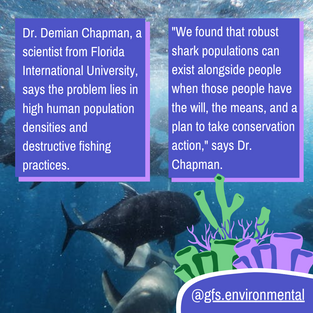Words Matter: Reef Robbery
- girlsforscience

- Aug 24, 2020
- 2 min read
According to researchers, there were almost no sharks on 69 reefs across the Dominican Republic, the French West Indies, Kenya, Vietnam, the Windward Dutch Antilles, and Qatar. This is worrisome; ecosystems rely on food chains to keep populations of various animals under control. The sharks, according to Dr. Demian Chapman who is the Global FinPrint co-lead and Associate Professor in the Department of Biological Sciences and Institute of Environment at Florida International University, are dying off due to three main factors: the "intersection between high human population densities, destructive fishing practices, and poor governance." Global FinPrint is led by Florida International University as an initiative of the Paul G. Allen Family Foundation. They perform data collection and analyze the world's populations of reef sharks.
Conservation efforts by citizens and governments can help solve this issue, promoting the protection of shark populations, and taking care of general ocean health. Professor Simpfendorfer reflects on Australia's positive efforts in protecting these sharks, "We're up there along with such nations as the Federated States of Micronesia, French Polynesia, and the US. These nations reflect key attributes that were found to be associated with higher populations of sharks: being generally well-governed, and either banning all shark fishing or having strong, science-based management limiting how many sharks can be caught." U.S. citizens can help take care of the oceans and thus help sustain shark populations. Keeping oceans clean is important, therefore living by the phrase, "Reduce, Reuse, and Recycle" is a great way to begin decreasing your carbon footprint and littering in oceans. It is a saying that has been around for decades, yet it is one of the first steps to helping the environment. Animals need clean oceans and environments to survive and thrive, so do your part in helping the world become a better place. Signing petitions to make Shark Fin an illegal substance and donating to causes that help conserve ocean wildlife can help bring sharks and even general wildlife populations back. Even just spreading the word, doing beach clean-ups with friends, and volunteering with wildlife organizations can make a positive change. Keeping shark products out of cosmetics, restaurants, and stores, by not supporting places that sell them can push sellers to stop selling things with shark ingredients. By reducing the sales of these shark ingredient filled items, the demand within the market decreases, and thus the companies stop killing sharks to make these products. Shark conservation organizations are a great place to volunteer and work with, or just to donate to.
Sources:
Written by: Hannah Burleson
Edited by: Katie Last and Nicole Wilkes
Graphic by: Smyrna Davalath









Comments